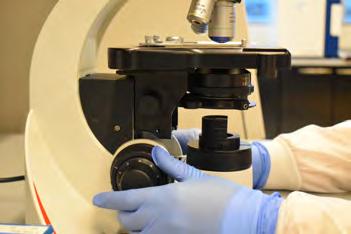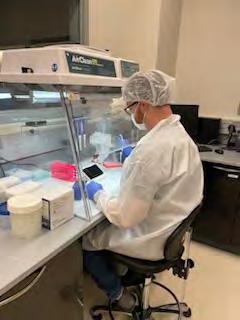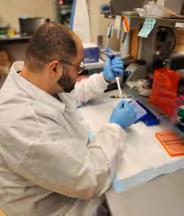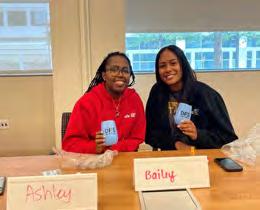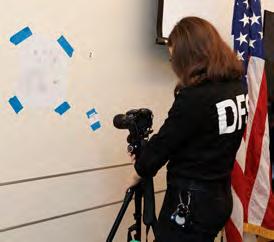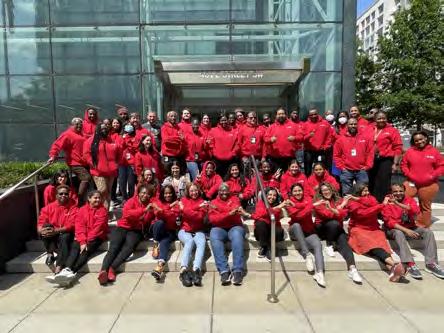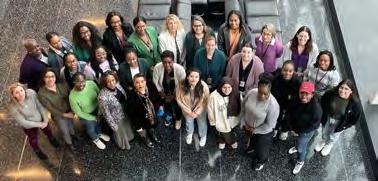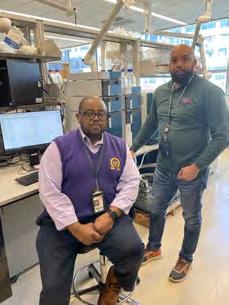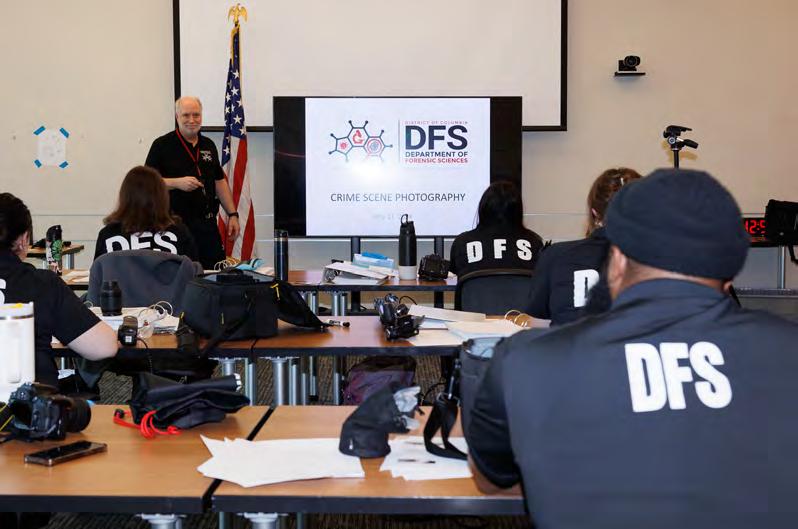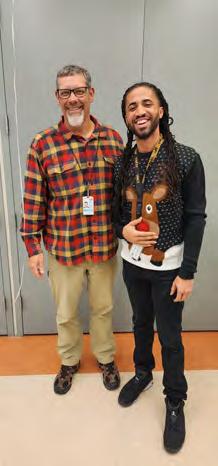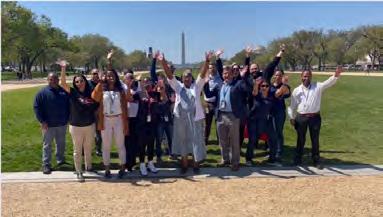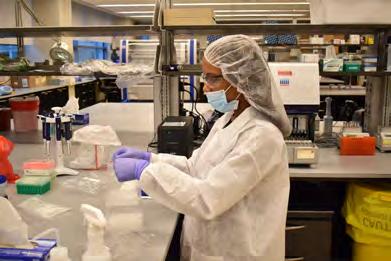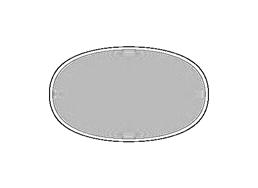Sound Science, Safer Streets FISCAL YEAR 2023 ANNUAL REPORT
GO VERNMEN T OF T HE DISTRICT OF COL UMB IA DE PAR TM ENT OF FORE N SI C SC IE NC ES

































Dear Resident,

GO VERNMEN T OF T HE DISTRICT OF COL UMB IA DE PAR TM ENT OF FORE N SI C SC IE NC ES

































Dear Resident,
Fiscal Year 2023 (FY23) saw significant advancements at the Department of Forensic Sciences (DFS), leveraging resources allocated by Mayor Muriel Bowser to enhance safety in Washington, D.C. for residents and visitors alike. In May 2023, Mayor Bowser appointed me, Francisco J. Díaz, as Interim Director of DFS, a role I assumed alongside my existing position as Chief Medical Examiner for the District.
After a year serving in this capacity, I'm pleased with our progress and optimistic about our continued efforts to use science to improve safety in the District. As head of the Consolidated Forensic Laboratory, I lead a skilled team of forensic scientists, public health experts, and administrators. Our collective aim is to fulfill the mission of the Department: delivering top-tier, prompt, precise, and dependable forensic science and public health services while adhering to best practices and cutting-edge technology, with an emphasis on unbiased science and transparency to bolster public safety. During my first year I have prioritized staff development, allocating resources to enhance training and laboratory methodologies. I've focused on aligning our resources with strategic goals and improving communication and transparency with all stakeholders.
Key accomplishments include:
• Two International Association of Identification (IAI) certified latent scientists in the Latent Fingerprint Unit (LFU)
• Approval status of two ANSI National Accreditation Board (ANAB) qualified forensic assessors within the Forensic Biology Unit (FBU)
• Issuance of the FBU’s first Combined DNA Index System (CODIS) match notification reflecting the ANAB accreditation symbol
• The Crime Scene Sciences Unit (CSSU) offered nine (9) different training courses for staff during FY23 to increase their job knowledge and skill sets
• The Public Health Laboratory (PHL) tested over 2,600 bioterrorism samples
While a more comprehensive review will be available in our Fiscal Year 2024 report, it's worth noting that our forensic biology and chemistry units successfully obtained ANAB reaccreditation.
Mayor Muriel Bowser is actively supporting the DFS in its reaccreditation efforts for the Latent Fingerprint Unit (LFU) through funding the recruitment of key positions, specialized consulting, staff training, and equipment. I extend my gratitude to Mayor Bowser for her unwavering support of DFS and the Consolidated Forensic Sciences Laboratory. I also thank City Administrator Kevin Donahue, Deputy Mayor Lindsey Appiah, Councilmember Brooke Pinto, and their staff for their ongoing backing as we work towards the Mayor's vision of a safer, stronger D.C. Lastly, I acknowledge our public safety partners and the dedicated DFS staff whose efforts are always working towards advancing science and advancing safety.
Sincerely,
Francisco J. Díaz, MD, FCAP, FASCP Interim Director
CSS provides high-quality, around-the-clock support through its two units: the Crime Scene Sciences Unit (CSSU) and the Central Evidence Unit (CEU). When crimes occur, there are often hundreds if not thousands of pieces of evidence (e.g., blood, fingerprints, weapons, cartridge casings, and clothing) that must be processed. CSSU is responsible for responding to crime scenes and extracting every possible piece of physical evidence on a crime scene according to a strict code of standards. The forensic scientist photographs, collects, processes, documents, and preserves all evidence for future analysis. Once evidence has been collected, packaged, and identified, the evidence is transported to the forensic laboratory. CEU personnel thoroughly document and store the evidence in its proper area to keep it from degrading or changing over time. To yield greater clarity on what occurred during a crime, the evidence must be viewed within the context in which the crime took place. Its integrity must not be compromised
HE CSS is a 24/7 operation and was responsible for responding to thousands of crime scenes to collect and preserve more than 55,898 items of evidence in FY22 — at or as close as possible to the time of the original crime report. CSS is comprised of a diverse team that includes law enforcement professionals, forensic laboratory technicians, civilian crime scene technicians and property technicians. This diversity of backgrounds is the team’s strength.
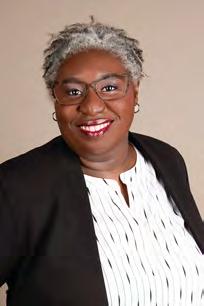


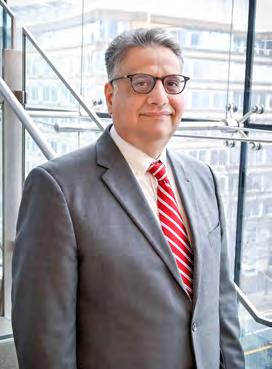
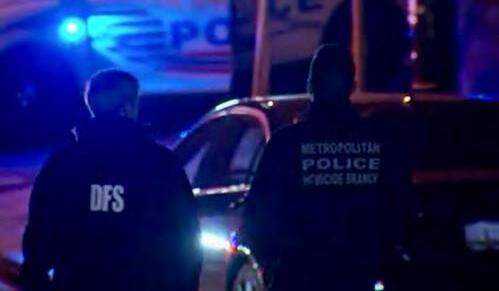

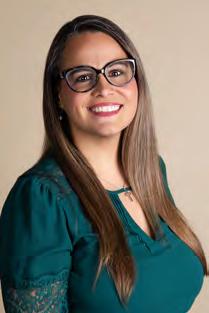

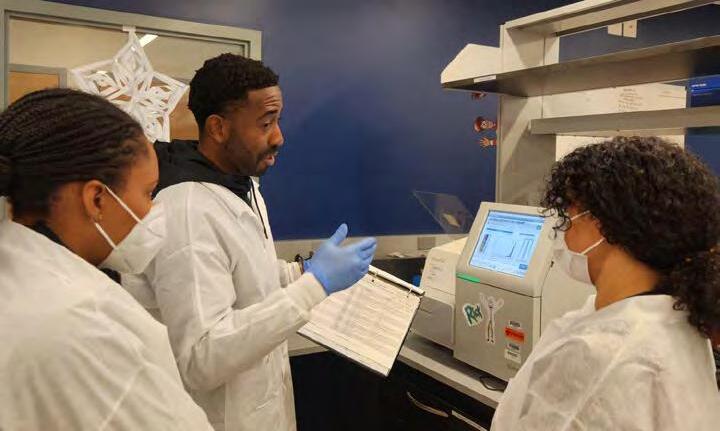
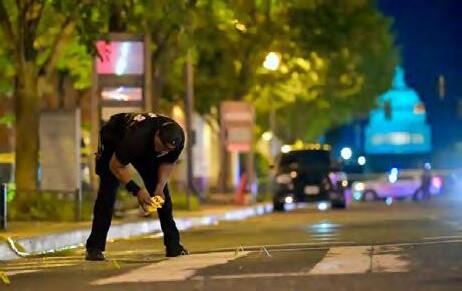




The Public Health Laboratory (PHL) is responsible for identifying and characterizing infectious pathogens (bacteria, fungi and viruses), dangerous substances (heavy metals and toxic or volatile materials), and other hazards to public health and safety. Throughout Fiscal Year 2023, the community relied on the PHL’s services to track influenza, COVID-19, mosquito borne illness and potential biological threats. In FY23, the PHL performed 154 proficiency tests and 25,718 clinical and surveillance tests.
The PHL consists of several units: The Immunology and Virology Unit (IVU), The Accessioning Unit (ASU), Next Generation Sequencing (NGS), Microbiology Unit (MBU), Molecular Diagnostic Unit (MDU), Clinical Toxicology Unit (CTU), and Bioterrorism Unit (BTU)
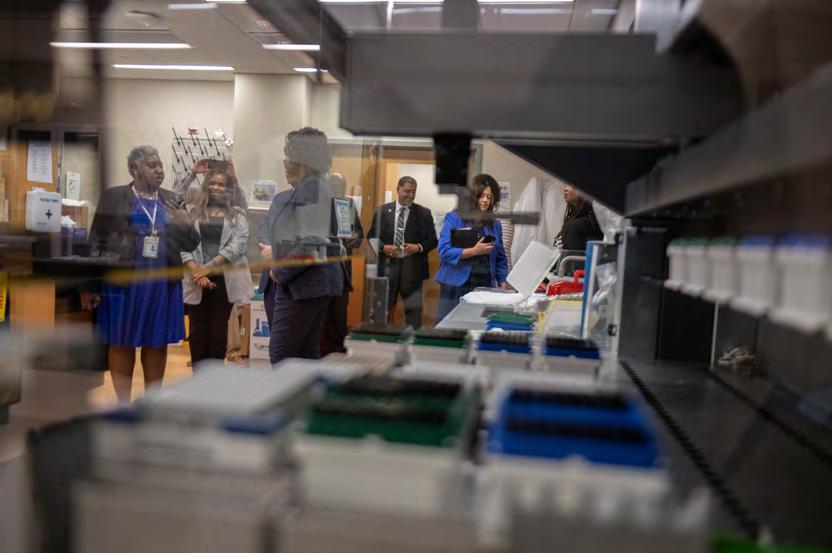

The Immunology and Virology Unit (IVU) played a crucial role in protecting public health through its collaboration with DC Health. This partnership focused on comprehensive surveillance of West Nile Virus (WNV) in endemic mosquito species collected across the District of Columbia.
During FY23, the Immunology and Virology Unit played a crucial role in protecting public health through its collaboration with DC Health. This partnership focused on comprehensive surveillance of West Nile Virus (WNV) in endemic mosquito species collected across the District of Columbia.
During the FY23 mosquito surveillance season, the IVU tested 331 mosquito pools for WNV, identifying seven positive pools. This surveillance of arboviruses assists public health authorities and researchers in understanding risk factors, transmission patterns, and potential outbreaks. The information gathered is used by DC Health to guide educational campaigns when positive mosquitoes are detected in the form of posting flyers on homes and businesses within a half-mile radius of the positive trap site.
During the FY23 mosquito surveillance season, the IVU tested 331 mosquito pools for WNV, identifying seven positive pools. This surveillance of arboviruses assists public health authorities and researchers in understanding risk factors, transmission patterns, and potential outbreaks. The information gathered is used by DC Health to guide educational campaigns when positive mosquitoes are detected in the form of posting flyers on homes and businesses within a half-mile radius of the positive trap site.
The IVU also provided same-day testing results for rabies samples submitted by DC Health and the Smithsonian National Zoo. In FY23, the unit tested 116 rabies samples, confirming five positive cases in bats and raccoons as the major animal species positive in the district in FY23.
The IVU also provided same-day testing results for rabies samples submitted by DC Health and the Smithsonian National Zoo. In FY23, the unit tested 116 rabies samples, confirming five positive cases in bats and raccoons as the major animal species positive in the district in FY23.
titled "Automated Molecular Detection of West Nile Virus in Mosquito Pools using the Panther Fusion System. In FY23 staff members from IVU submitted “Automated molecular detection of West Nile Virus in mosquito pools using the Panther Fusion system” - ScienceDirect, the article was published in FY24.
In FY23, IVU conducted extensive SARS-CoV-2 testing using multiple testing methods, examining 17,317 specimens and identifying 559 positive cases, primarily from long-term care facilities.
The IVU actively contributed to the scientific community in FY23 by:
• Delivering an oral presentation at the Hologic Panther Fusion Open Access Educational Symposium, sharing insights on developing laboratory-developed tests using the Panther Fusion system.
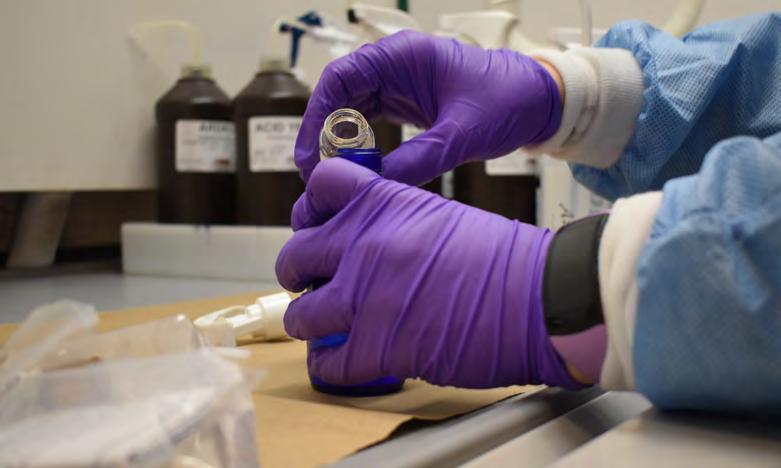
• Authoring a manuscript titled "Automated Molecular Detection of West Nile Virus in Mosquito Pools using the Panther Fusion System," which was published in FY24 in the Journal of Virological Methods Volume 326, May 2024, 114893.
These efforts demonstrate the IVU's commitment to advancing public health through both practical surveillance and academic contributions.
The Accessioning Unit (ASU) receives and tracks all specimens received at the PHL. ASU receives isolates and supplies and directs them to the appropriate laboratory. In FY23, the unit achieved several vital accomplishments. ASU developed and implemented new procedures for wastewater processing, including the receiving, aliquoting, processing, and concentration of all wastewater samples. An increase in trained personnel within the Accessioning Unit support ed this operation enhancement. Staff members were cross-trained in several units, including sample receiving and processing, which improved operational flexibility and efficiency. Regular rotation of staff members to other units was instituted to maintain and update their com petencies.
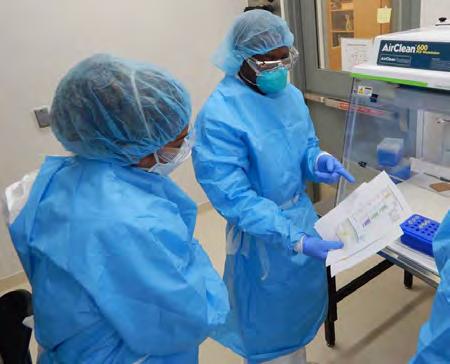
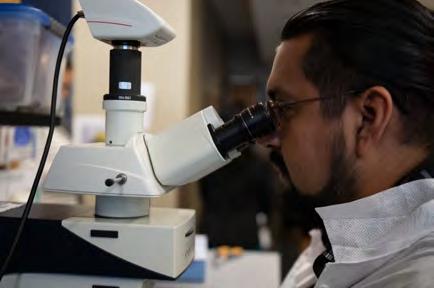
The Accessioning Unit (ASU) receives isolates and supplies and directs them to the appropriate laboratory. In FY23, the unit achieved several vita
The Accessioning Unit serves as the central hub for receiving and tracking all specimens at the PHL. This unit is responsible for receiving, isolating, and directing samples to the appropriate laboratory sections.

(202) 727-5566
In FY23, the ASU achieved several significant accomplishments:
• Wastewater Processing: The unit developed and implemented new procedures for wastewater analysis, encompassing receiving, aliquoting, processing, and concentrating all wastewater samples
• Staff Training: To enhance operational capabilities, additional PHL personnel were trained in these new procedures
• Cross-Training Initiative: Staff members were cross-trained across several units, including sample processing and receiving. This initiative significantly improved operational flexibility and efficiency
• Rotation Program: A regular rotation of staff members to other units was established to maintain and update their competencies, ensuring a versatile and skilled workforce
These improvements have strengthened the ASU's capacity to handle diverse sample types and support the PHL's overall mission effectively
In FY23, the Next Generation Sequencing Laboratory, part of the PHL, conducted comprehensive genomic surveillance in the District. The lab sequenced 2,040 SARS-CoV-2 samples, identifying notable variants circulating in the region
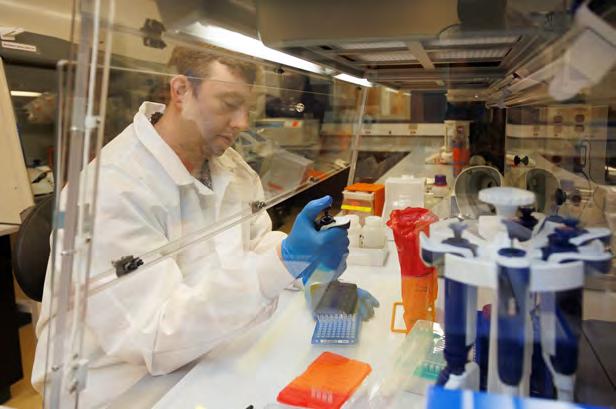

The NGS Laboratory also played a crucial role in analyzing bacteria responsible for foodborne illnesses, including E. coli, salmonella, listeria, campylobacter, vibrio, and shigella. During this period, the lab received and tested 199 samples, marking a significant increase of 53 samples (36%) from the previous fiscal year.
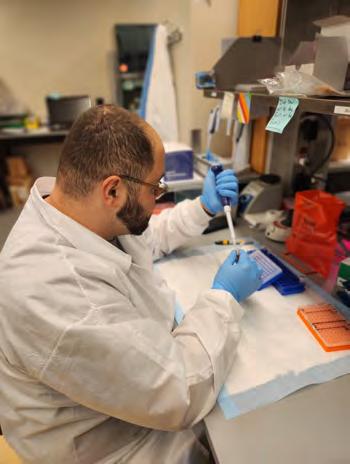
Through these efforts, the laboratory identified 13 outbreaks involving 25 samples, representing 13% of all samples sequenced. These events, which encompass both local and national outbreaks, highlight the laboratory's significant contribution to multi-level foodborne illness surveillance and outbreak response efforts.
Throughout FY23, the NGS Laboratory actively engaged with the scientific community, demonstrating its leadership and expertise in surveillance and public health response. The team participated in various academic and professional events, delivering poster presentations, moderating sessions, and presenting on innovative topics such as wastewater sequencing. These activities not only showcased the laboratory's advanced capabilities but also reinforced stakeholder confidence in the lab's position as a leader in the field of public health.
The Microbiology Unit is a key participant in several CDC-funded programs that significantly impact public health:
•Antimicrobial Resistance Laboratory Network (ARLN)
•PulseNet/National Antimicrobial Resistance Monitoring System (NARMS)
•Gonococcal Isolate Surveillance Project (GISP)
•Environmental Legionella Isolation Techniques Evaluation (ELITE) program
Additionally, MBU performs post-mortem diagnostic testing for the Office of the Chief Medical Examiner (OCME). MBU's primary function involves the isolation, identification, and characterization of pathogens of public health concern, including:
• Foodborne pathogens (PulseNet/NARMS): Salmonella, Shigella, Campylobacter, Shiga Toxin Producing Escherichia coli (STEC), Yersinia, Vibrio, and Listeria
• Antimicrobial resistant organisms (ARLN): Carbapenemase-resistant organisms (CRO) and Candida auris (or other pathogenic Candida species)
• Environmental monitoring: Legionella pneumophila and related species capable of causing respiratory distress in immunocompromised individuals
In FY23, MBU received approximately 1,100 specimens:
•100 GISP isolates
•100 CRO isolates
•200 Candida species
•300 foodborne pathogens
•400 OCME specimens
MBU is actively working to address the antimicrobial resistance epidemic and monitor trends through:
• Validation tests for GISP Neisseria gonorrhoeae, which causes sexually transmitted infections
• ARLN antibiotic-resistant bacteria testing
The unit continues its decades-long history of testing and reporting the incidence of foodborne pathogen recovery in the district. Through these efforts, MBU strives to ensure efficiency, enhance laboratory performance and reliability, and maintain compliance with clinical and other laboratory standards.
In FY23, the Molecular Diagnostics Unit provided critical surveillance testing for influenza and SARS-CoV-2 within the District. During the influenza surveillance season, MDU tested 1,616 respiratory specimens for influenza A, influenza B, and SARS-CoV-2. The analysis revealed:
• 392 positive cases for influenza
• 54 positive cases for SARS-CoV-2
• 16 cases of dual infections
MDU also conducted extensive SARS-CoV-2 surveillance testing as part of the CDC National SARS-CoV-2 Strain Surveillance (NS3) System, examining 3,648 specimens and identifying 3,062 positive cases. Select positive samples are submitted to the NS3 system to provide a representative set of viruses for sequencing. Additionally, a separate subset of samples are transferred to the Next Generation Sequencing (NGS) unit for internal sequencing. The unit also expanded its capabilities by adding SARS-CoV-2 surveillance from wastewater, testing 48 samples per week. These efforts demonstrate MDU's crucial role in identifying and monitoring respiratory pathogens of public health concern.
Additionally, MDU continued to test samples for mpox (formerly known as monkeypox) as part of the ongoing mpox clade II outbreak that began in the U.S. in May 2022. In FY23, MDU tested 106 samples and identified 13 positives.
The Clinical Toxicology Unit is an integral part of the Laboratory Response Network for Chemical Threats (LRN-C), a national network comprising the CDC, state, and local Public Health Laboratories (PHLs). This network is designed to respond effectively to chemical terrorism and other public health emergencies.
In FY23, the CTU maintained a robust emergency preparedness profile by:
• Demonstrating competency in several core CDC LRN-C Program analytical test methods
• Achieving critical verifications using upgraded equipment
• Successfully completed Proficiency Testing (PT) in the LRN-C PT programs
• Successfully verifying tests to detect toxic chemicals, including:
◦ Tetramine
◦ Cyanide
◦ Volatile Organic Compounds (VOCs)
These accomplishments enhance the CTU's capability to rapidly identify and respond to chemical threats, thereby strengthening public health security in the region.
The Bioterrorism Unit is a critical component of the District's Public Health Emergency Preparedness and Response to potential bioterrorism (BT) incidents. The BTU serves dual roles:
• Primary Mission: Detection and identification of bioterrorism agents using biochemical, molecular and serological techniques
• Support Function: Acts as a core and internal reference laboratory for other units, including:
◦ MBU
◦ IVU
◦ Other laboratories
FY23 Achievements
• Sample Testing:
• Proficiency Testing:
◦ Achieved a perfect score (100%) on all four Laboratory Response Network and College of American Pathologists proficiencies
◦ Cross-trained two staff members, expanding testing capabilities
◦ Increased the number of SRA-approved BTU staff members
• Outreach and Training:
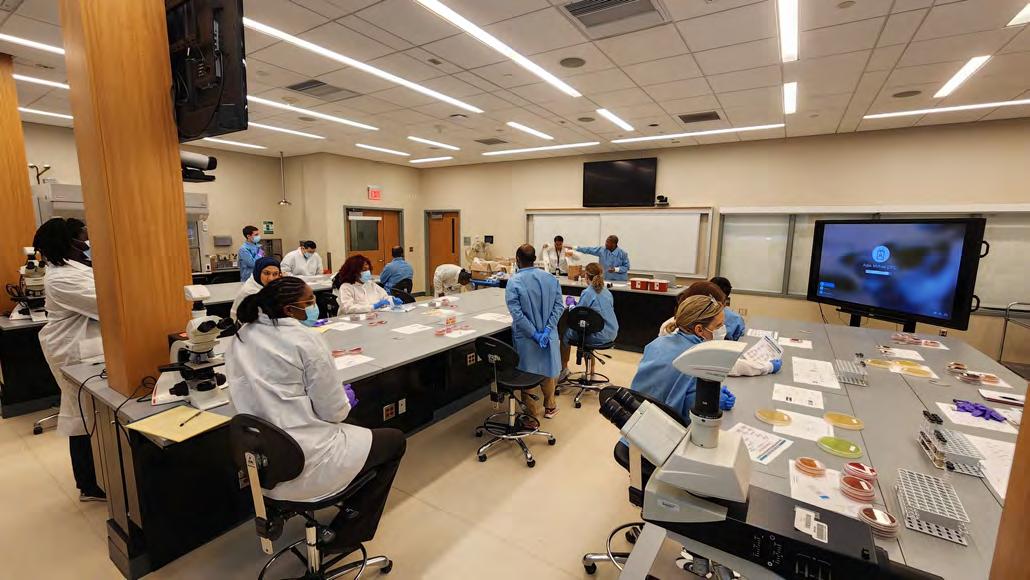
• Staff Development: Conducted external training, including a hybrid BT workshop for Sentinel
These accomplishments demonstrate the BTU's commitment to maintaining
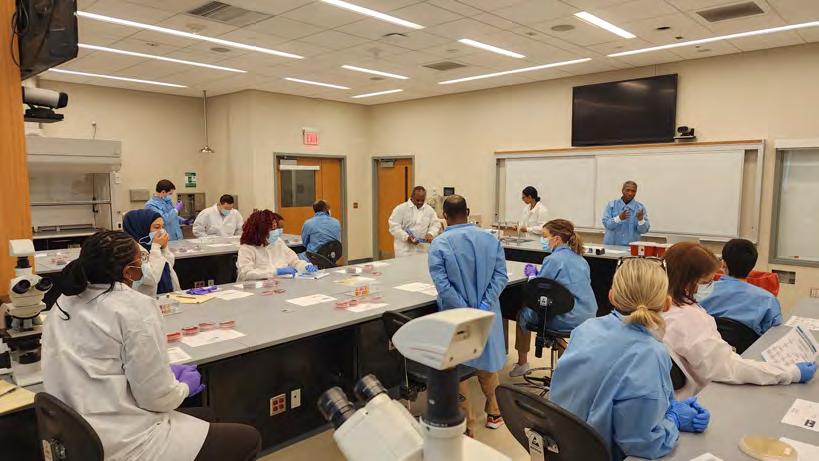
The Crime Scene Sciences (CSS) Division operates 24 hours a day, 7 days a week, playing a crucial role in criminal investigations. CSS is composed of a diverse team of professionals that include forensic laboratory technicians, crime scene technicians, and property technicians. This multidisciplinary approach is the team's key strength, allowing for comprehensive and efficient crime scene processing. The diverse backgrounds and expertise of CSS staff enable the division to handle a wide range of crime scenes effectively, ensuring thorough evidence collection and preservation for subsequent forensic analysis and legal proceedings.
HE CSS is a 24/7 operation and was responsible for responding to thousands of crime scenes to collect and preserve more than 55,898 items of evidence in FY22 — at or as close as possible to the time of the original crime report. CSS is comprised of a diverse team that includes law enforcement professionals, forensic laboratory technicians, civilian crime scene technicians and property technicians. This diversity of backgrounds is the team’s strength.

CSS provides high-quality support through three specialized units; The Crime Scene Sciences Unit (CSSU), the Central Evidence Unit (CEU), and Forensic Processing Garage.
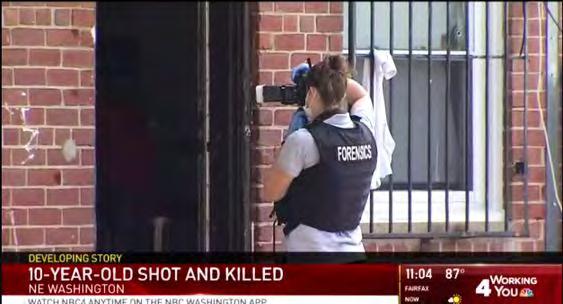

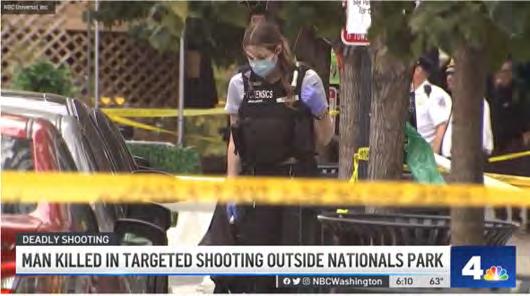
CSSU is responsible for responding to crime scenes and meticulously processing all physical evidence according to strict standards. Forensic scientists:
•Photograph the scene
•Collect and process evidence
• Document findings
•Preserve evidence for future analysis
In FY23, CSSU:
• Independently processed 12,251 crime scenes
• Received 8,580 service requests
•Offered 9 different training courses to enhance staff knowledge and skills
Once evidence is collected and packaged, CEU takes over. CEU personnel:
•Receive and document evidence
•Transfer items as needed
•Outsource analysis when required
•Store evidence in appropriate conditions to maintain integrity
To fully understand a crime, evidence must be viewed within the context of the incident. Maintaining the integrity of evidence is crucial to ensure:
•Accurate analysis
•Prevention of degradation or alteration over time
•Admissibility in legal proceedings
This comprehensive approach, from crime scene sciences to storage, ensures that every piece of evidence, from blood and fingerprints to weapons and clothing, contributes to a clear picture of the crime for investigators and prosecutors.
The Forensic Science Laboratory (FSL) is made up of four units: the Forensic Biology Unit (FBU), the Forensic Intelligence Unit (FIU), the Latent Fingerprint Unit (LFU) and the Forensic Chemistry Unit (FCU). FSL currently partners with accredited laboratories to provide Automated Fingerprint Identification System (AFIS) and Combined DNA Index System (CODIS) forensic identification intelligence and outsources evidence submitted for forensic testing in support of investigations and criminal prosecutions.
HE CSS is a 24/7 operation and was responsible for responding to thousands of crime scenes to collect and preserve more than 55,898 items of evidence in FY22 — at or as close as possible to the time of the original crime report. CSS is comprised of a diverse team that includes law enforcement professionals, forensic laboratory technicians, civilian crime scene technicians and property technicians. This diversity of backgrounds is the team’s strength.
Additionally, FSL has established contractual services with several accredited outsourcing vendor laboratories to provide forensic testing services in association with criminal investigations and prosecutions. These partnerships ensure timely, high-quality forensic testing services are provided to the District of Columbia. This strategic approach allows FSL to leverage external expertise while maintaining focus on its core competencies, ensuring comprehensive forensic support for the criminal justice system.

DFS partners with the Bureau of Alcohol, Tobacco and Firearms (ATF) to conduct the processing of firearms related evidence, test fires and National Integrated Ballistic Information Network (NIBIN) entries.


The Forensic Biology Unit (FBU) specializes in serological and DNA testing of physical evidence collected from crime scenes within the District.
• Received and tested 280 Physical Evidence Recovery Kits (formerly sexual assault kits) from the Metropolitan Police Department (MPD)
• 224 kits (80%) completed within the 90-day window stipulated by the Sexual Assault Victims' Rights Amendment Act (SAVRAA)
• Average turnaround for receipt and testing of Physical Evidence Recovery Kits: 80 days
Due to the suspension of forensic casework in April 2021, FBU partnered with two state government laboratories to ensure continuity of Combined DNA Index System (CODIS) services. In FY23, this partnership resulted in 59 CODIS hits.
• SAVRAA Education: Accomplishments
◦ Presented to sexual assault nurse examiners (SANEs)
◦ Conducted pediatric SANE training at Children's National Hospital
• Academic Outreach:
◦ Engaged with Howard University, George Washington University, and New England College to discuss DNA testing, laboratory processing, and CODIS
• Professional Development:
◦ Attended multiple conferences and meetings, including the CODIS State Administrators Meeting and the International Society for Forensic Genetic symposium
◦ Participated in Forensic Internal Auditing to ISO/IEC 17025:2017 course
• Technological Advancements:
◦ Validated QIAsymphony for higher-throughput casework
◦ Developed methodology for testing Fired Cartridge Casings as per stakeholder request
• Community Engagement:
◦ Sponsored a tour to the Los Angeles Crime Laboratory
These activities demonstrate FBU's commitment to education, professional development, and technological advancement in forensic biology, while maintaining crucial services for the District.

FBU made significant strides in educating healthcare professionals about SAVRAA:
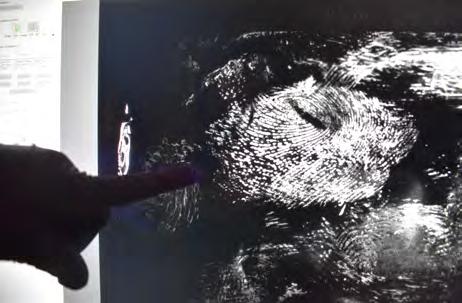
◦ Presented to a cohort of sexual assault nurse examiners (SANEs)
◦ Created a recorded version for future training session
• Pediatric Specialization:
◦ Conducted specialized SANE training at Children's National Hospital, focusing on pediatric cases
• SAVRAA Awareness:
◦ FBU analysts highlighted the importance of SAVRAA
◦ Explained agency’s initiatives to ensure timely information delivery to sexual assault survivors
These efforts demonstrate FBU's commitment to improving the understanding of SAVRAA among healthcare professionals, ultimately enhancing support for sexual assault survivors in the District.
In FY23, FIU received and processed a total of 3,512 requests from key stakeholder agencies. FIU provides an invaluable service by triaging forensic testing requests and establishing impactful, strategic forensic testing plans in collaboration with the following agencies:
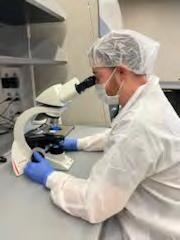
•Metropolitan Police Department
• United States Attorney's Office
• Office of the Attorney General for the District of Columbia
•DC Department of Corrections
•United States Park Police
•Metro Transit Police Department
FIU’s FY23 requests for testing are broken out by unit, illustrating the relative volume of requests passed on to each unit.
FIU continues to work with internal and external customers to enhance the request for testing process.
FIU participated in training opportunities to include multiple presentations at the Crime Scene Sciences Academy which is hosted by DFS and attended by crime scene units of multiple partner agencies.
•ANAB Internal Auditors Course
LFU analysts examine unidentified or latent prints recovered from evidence items to assess their significance. Suitable latent prints are compared with known exemplars to establish their source. These prints may also be inputted into the Automated Fingerprint Identification System (AFIS), a biometric database leveraging digital imaging technology for capturing, storing, and analyzing latent print data. The prints are then searched against stored known exemplars, generating potential source candidates that are subsequently evaluated by LFU analysts. AFIS outcomes have generated intelligence leads for numerous DFS customers.
In FY23, latent print analysis was completed for 784 cases.
The collection and entry of latent prints into AFIS are key functions of LFU. In FY23, 1,914 entries were made into AFIS, resulting in 452 hits.
Below, AFIS entries and hits are broken down by quarter.
Training: LFU is committed to continuously improving the quality of their work and staying up to date with the latest advancements in forensic science. As a part of this commitment, the unit has undergone an extensive training program with Evolve Forensics to strengthen their skill sets and enhance their work product. This training program has equipped the unit with the necessary knowledge and skills to provide accurate and reliable results, helping them to better serve the District and contribute to the investigation and resolution of cases.
Members of LFU also participated in the Forensic Internal Auditing to ISO/IEC 17025:2017 course. After successfully completing the training program, all LFU analysts became IAI certified latent print examiners. Lastly, the LFU attended the 107th International Association for Identification (IAI) Educational Conference. Investing in training and professional development ensures LFU is providing the highest level of service to the District and its stakeholders.
In FY23, FCU provided seized drug testing services to the District through an outsourcing partnership with NMS laboratory. FCU outsourced 90 cases during FY23.
FCU continued its partnership with the CDC-funded Overdose Data to Action (OD2A) grant-funded drug surveillance program. The OD2A grant program provides actionable intelligence through the identification of emerging drug trends by processing de-identified syringes received from four (4) District harm reduction service providers.
In FY23, FCU received 2,774 syringes for processing, a 50% increase from FY22. The information gathered through this work serves not only the residents of the District but those of the nation as a part of the OD2A grant program.
Outsourcing (casework)
Outsourcing contract initiated in May 2023
Over the course of FY23, FCU achieved several major accomplishments. These included developing and implementing a paperless laboratory workflow for casework and syringe surveillance analysis. Furthermore, FCU was featured in a CNN interview on fentanyl which aired in March 2023 as well as featured in the September publication of the Journal of
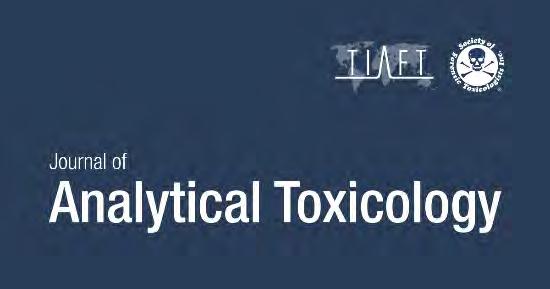
Analytical Toxicology. The journal publication, “Comparative Toxicology of Syringe Exchange and Post-Mortem Blood Samples in the District of Columbia: trends and Affinity Analysis” was completed in collaboration with DC OCME and DC Health.
https://academic.oup.com/jat/advance-article/doi/10.1093/jat/bdkad052/7235639?ogin=true
•Several members of the FCU team successfully completed the ANAB Internal Auditors Course
EDUCATIONAL OUTREACH
•Howard University STEM Week
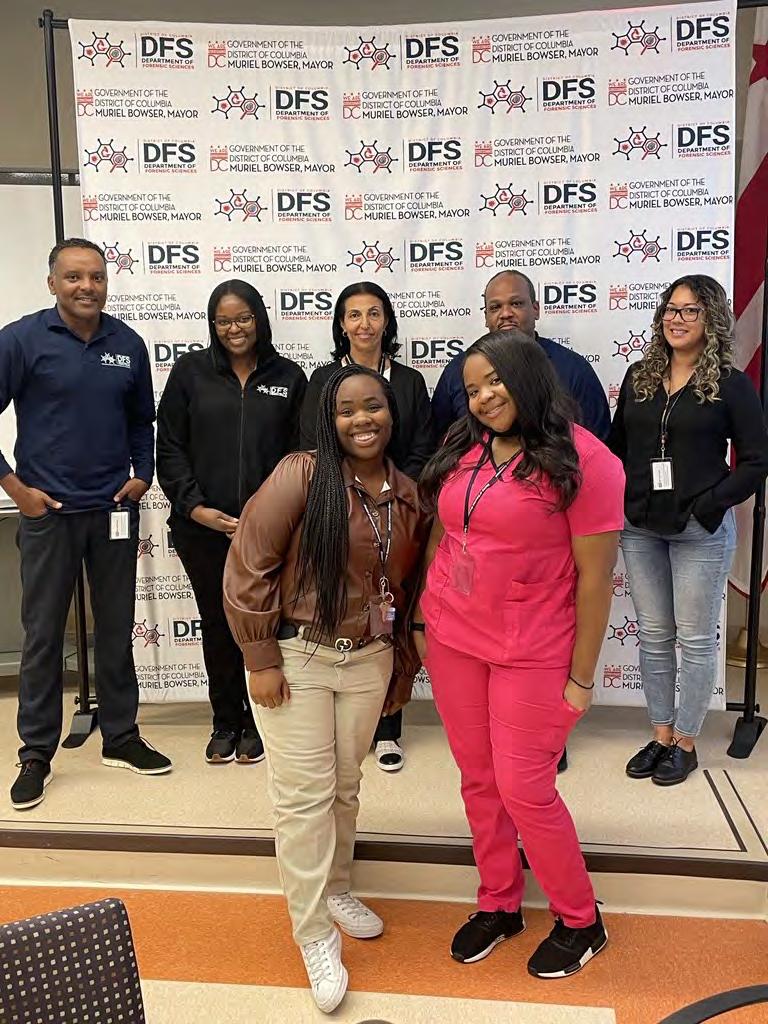
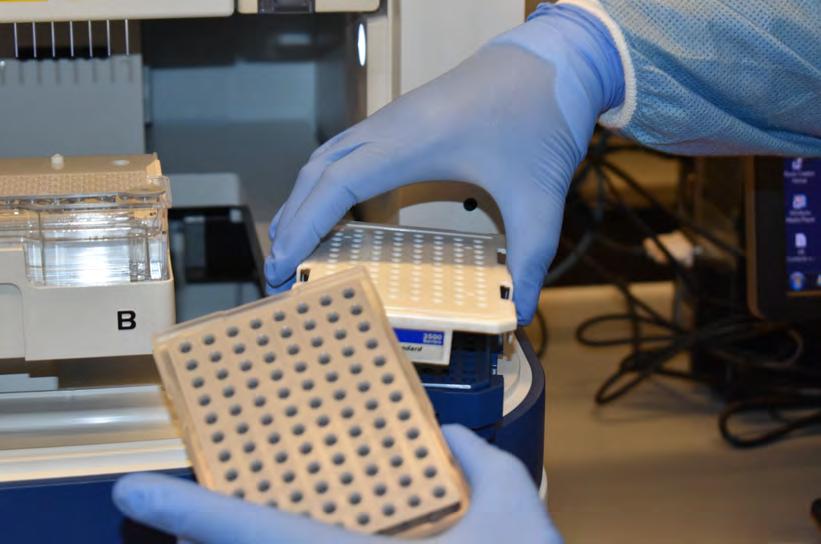
Administrative Support Units consist of the Chief Information Officer (CIO), Human Resources, Outreach and Training, Quality Assurance, and Operations (performance management, budget and procurement, facilities management, and health and safety). The Administrative Support Units provide high-level oversight and support to each division within DFS, ensuring that employee needs and concerns are met.
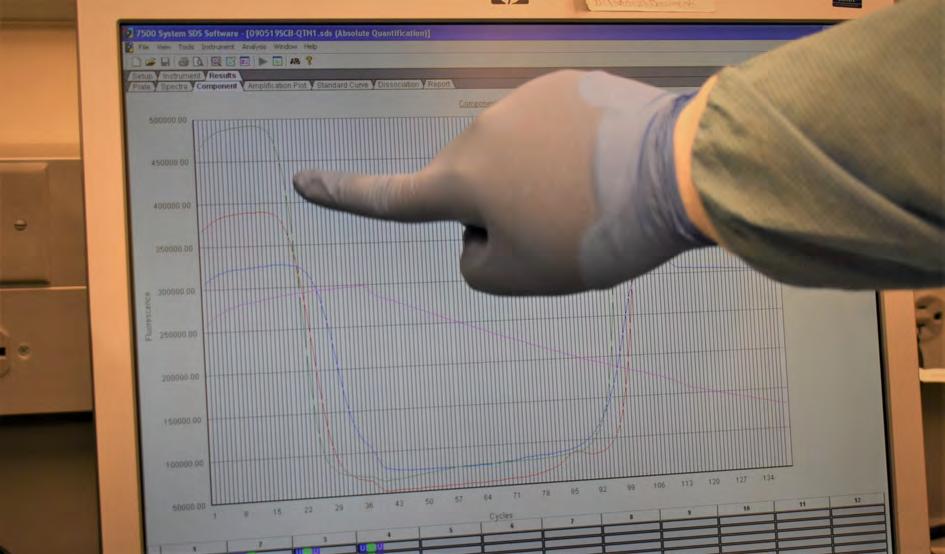
The CIO serves as the primary information technology solutions and service provider for DFS. Its mission is to deliver high-quality solutions and consistent, efficient support to the FSL, PHL, and CSS.
• Information Gathering: The CIO collects pertinent information relevant to DFS's technological needs and challenges, ensuring a comprehensive understanding of the Department's requirements.
• First-Contact Resolution: The unit provides prompt first-contact resolution, addressing immediate IT-related queries and concerns to minimize disruptions and maintain operational efficiency.
• Root-Cause Analysis: The CIO employs thorough root-cause analysis to identify and address the underlying causes of technological issues, ensuring long-term solutions and preventing recurrences.
• Proactive Communication: The unit publishes proactive outbound communications to keep DFS personnel informed about IT-related updates, best practices, and potential concerns, fostering a culture of collaboration and awareness.
• Strategic Acquisition Support: The CIO offers strategic support and consultation for IT acquisitions, ensuring that technology investments align with the agency's objectives and requirements and maximize the return on investment.
The CIO manages and maintains both on-site and cloud-based technologies that are vital and highly specialized systems designed to support the critical work of the Department of Forensic Sciences. These systems enable DFS to conduct its forensic and public health services effectively and efficiently.
Through its comprehensive range of services and solutions, the CIO is crucial in facilitating smooth operations and technological advancements within the Department of Forensic Sciences. The unit's expertise and dedication to providing reliable and innovative IT support are pivotal in empowering DFS to achieve its mission of delivering exceptional forensic and public health services to the community.

DFS’s Human Resources and Outreach team interacts with District residents and educates them about our work, continuing to build trust in our services. Our team works within neighborhoods, supporting a robust science, technology, engineering and mathematics (STEM) career pipeline for District residents and those who choose to work in our city. To support those efforts, in FY23, DFS Human Resources and Outreach staff hosted a myriad of educational tours for scholars at the elementary, middle, high school and collegial and university levels.
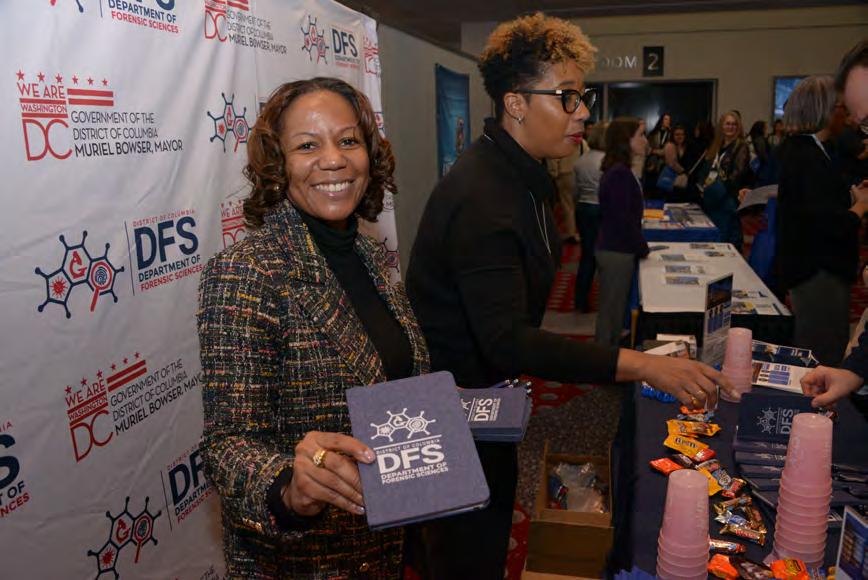
The scientists, laboratory technicians, senior leaders, administrative staff, and interns who do the important work of this agency are the agency’s “people.” It is the job of the agency’s HR and Outreach team to ensure that they receive the training, education, and support necessary to continue to deliver on their commitment to solid science and safer streets. Equally important is the “culture” that they cultivate for their employees. The agency wants to build camaraderie and a support system that creates an enabling environment for their work.
To that end, FY23 brought with it several People and Culture initiatives and team building events, including, a blood drive, holiday canned food and toy drive to help support District residents.
One of DFS’ own designed the DFS Wellness Room to provide a calm space to decompress, meditate, or just simply relax when needed most. FSL hosted an Employee Wellness Training Workshop and DFS hosted the DFS Walking Club to further promote health and wellness.
DFS’ Diversity, Equity and Inclusion (DEI) program is designed to create an inclusive cultural climate to ensure that the agency’s diverse workforce has access to the tools and support to succeed. As a part of this effort, DFS employees strive to exemplify the agency’s core values: accountability, trust and integrity.
DFS hosted several DEI watch sessions where attendees were encouraged to participate in open discussion following review of various DEI video resources.
National Forensic Science Week (NFSW): This event is a weeklong celebration of the dedicated DFS forensic scientists who strive to provide high-quality, timely, accurate, and reliable forensic science services to the District of Columbia. The annual event was held September 18-22, 2023. During the week, DFS shared messages of appreciation with staff and organized activities to celebrate our forensic disciplines. The event focused on team building though science oriented games that required individuals from various disciplines to work together while learning more about each other’s area of expertise.
Medical Laboratory Professionals Week: During this time, we celebrated and honored the vital work of PHL professionals in promoting and protecting the health of our communities. This annual event was held April 24-28, 2023. DFS management honored staff with team building events and laboratory games to further educate on the different units in PHL.
Internships are integral components of DFS’s outreach efforts. The agency attracted interns through a myriad of feeder programs and relationships with multiple colleges and universities such as American University, Bowie State University, George Mason University, George Washington University, and Howard University in FY23.
DFS also supports internship initiatives prioritized by the Mayor’s office, such as the District Leadership Program, which promotes employment opportunities that build pathways to the middle class.
The internship program provides scholars with practical experience and the type of exposure needed to strongly consider careers in public health, crime scene, and forensic science. Our internship projects run the gamut from mentorship and shadowing opportunities to conducting research and data collection. Our pool of interns are just as diverse, interesting, and dynamic as the scientists, technicians, and administrative staff at the DFS.
The agency hosted approximately 50 interns in our PHL, CSS, and FSL programs in FY23.
• PHL: Interns supported the program in creating laboratory kits and assisting with COVID-19 response preparation
• CSS: Interns supported the program records management project in digitizing legacy MPD crime scene reports by electronically filing them
• FSL: Interns supported the program in decontaminating equipment and supplies, records management of prints and conducted safety checks
DFS Tours: The Human Resources and Outreach Unit hosted multiple in-person educational tours, with several tours of 20 or more participants.
DFS Internships: The Human Resources and Outreach Unit continued its internship program in-person, and several interns were hired in full time positions within CSSU.
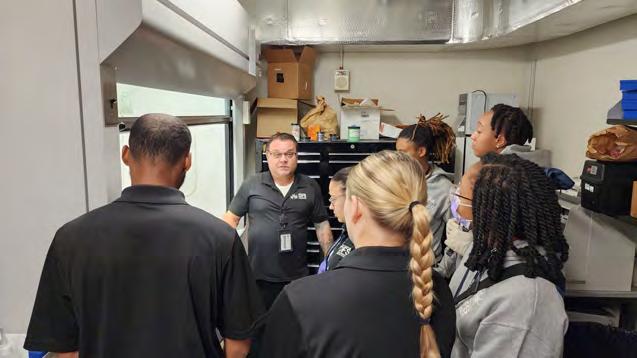

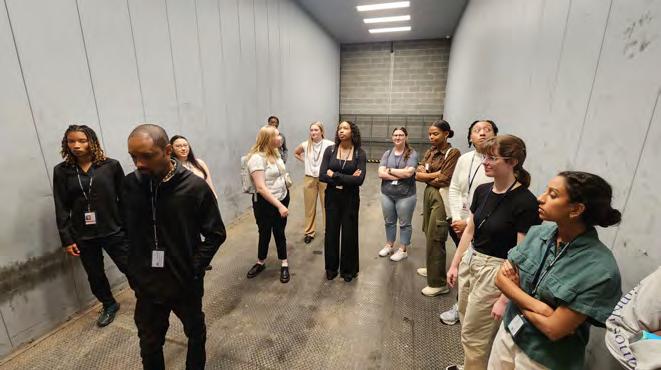
The Training Unit ensures the agency maintains the highest standards with respect to technology and emerging methodologies, and regularly trains scientists on the latest advancements in forensic science. The unit also works to enhance the staff’s technical skills, knowledge, and professional development. The Training Unit revised unit specific training manuals and facilitated several in-person trainings in FY23.
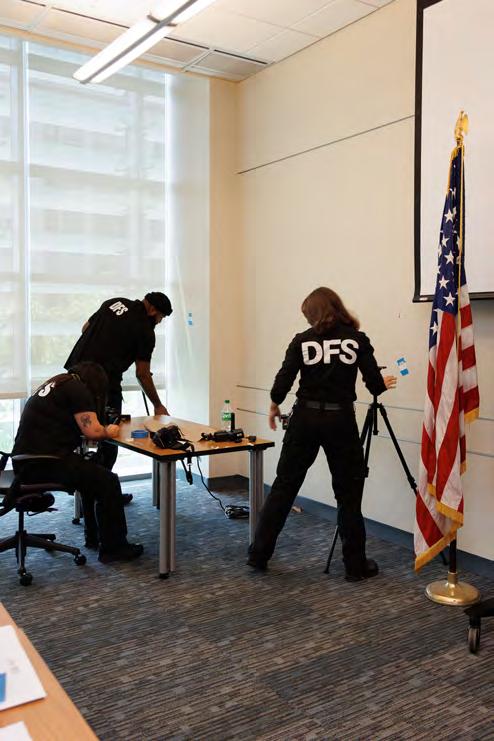
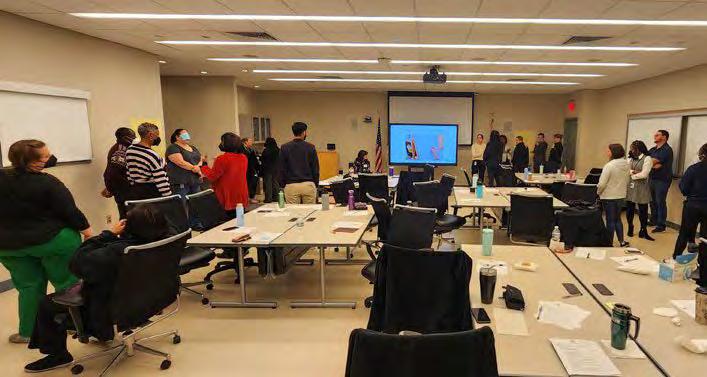
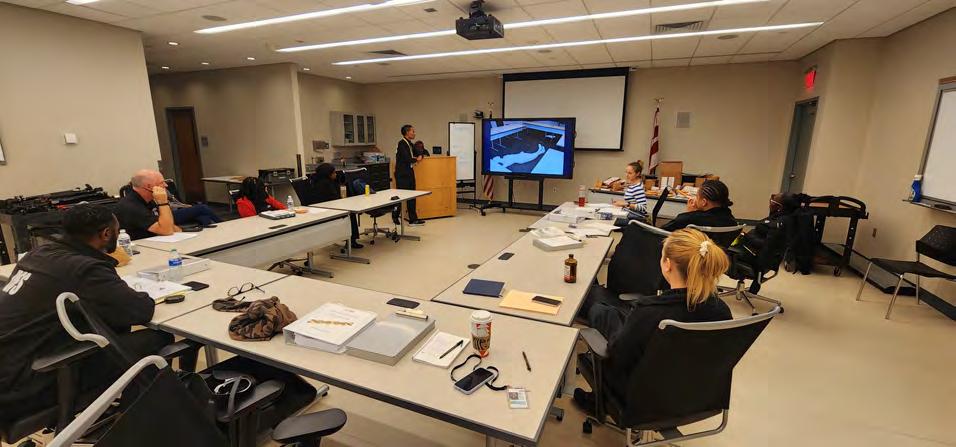
The DFS scientists completed a total of 4,261 hours of training in FY23. Below is a breakdown of training hours by employees over the past five years.
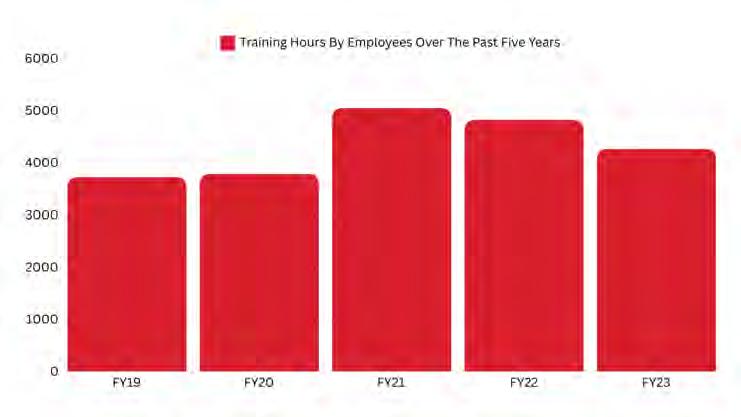
TYPES OF TRAINING
PHL + CSS + FSL
•BEGA Ethics Week
•Cybersecurity
• DHCR Conflict Resolution
• DFS Employees Sharing Knowledge (DESK)
•Technical Writing
•GW Management Training
• LIMS v3.8
•Manager’s Summit
PHL
•APHL Annual Conference
•GW Emerging Leaders Workshop
• Horizon LIMS Tech Forum
•ASM Microbe Annual Conference
•Preparedness Summit
•ASM Clinical Virology Symposium
• AACC Annual Scientific Meeting and Clinical Lab Expo
• Qualtrax
• Workplace Conflict Resolution
•Harassment Training
•Training and Travel
•Diversity Equity and Inclusion Workshops
•Meeting EEO and Workplace Disputes
• Annual Association of Forensic Quality Assurance Managers Training Conference
•Clinical Virology Symposium
•Pan American Society of Clinical Virology Molecular Workshop
•HOLOGIC Open Access Training
•The Future Action Symposium
Uplifting All Our Talent to Inspire the Future STEM Workforce
• SCIEX Advanced LC-MS/MS Training
•National Safety Council Safety Congress and Expo
CSS
•Advance photography
•Chemical Processing
•Evidence Management
•Latent Processing
•Shooting Reconstruction
•Crime Lite
•Advance Crime Scene Investigation
•Court Room Testimony
•Supervisor Training
•Major City Chiefs Forensic Investigations Conference
•ANAB Root Cause Analysis
•ANAB Forensic Technical Assessor Training for ISO/IEC 17025 or ISO/IEC 17020
•Vicarious Trauma
•VIII International Conference on Novel Psychoactive Substances
•International Society of Forensic Genetics
•Forensic Investigations Conference
•STACS DNA & Forensics User Conference
• BSS Next Generation Identification Conference
• AACC Annual Scientific Meeting and Clinical Lab Expo
• American Academy of Forensic Sciences Scientific Conference
•Establishing and Implementing Latent Print Suitability Criteria Webinar
• Molecular Diagnostic Courses – Clinical Genomics: A Review of Technology and Clinical Applications
• STRmixTM Virtual Refresher
•CODIS State Administrators Meeting
•National CODIS Conference
•2023 American Academy of Forensic Sciences Conference
• 2023 NIJ Forensic Science Research & Development Symposium
• 9th Annual Workshop on STRmix Implementation and Casework Approach
• Global Forensic and Justice Center 12th Annual Forensic Science Symposium
•Technical Leader Summit
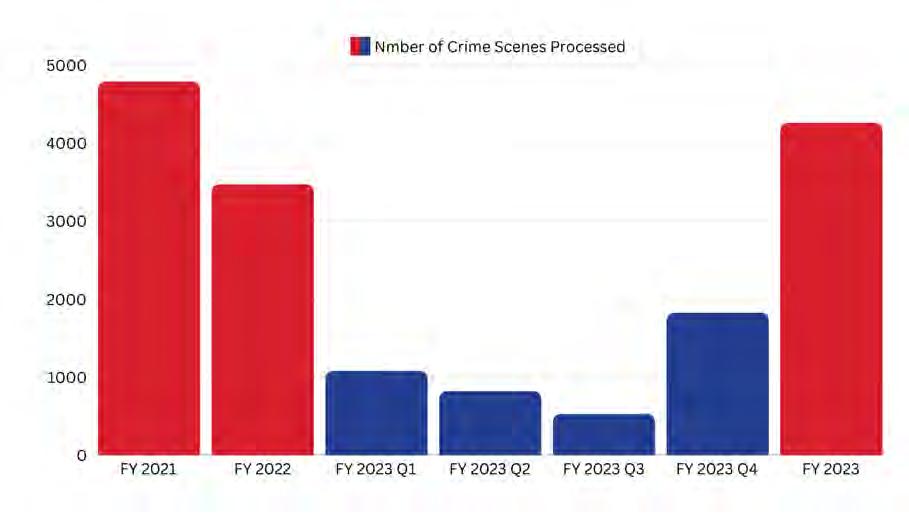
The Quality Assurance Unit is instrumental in ensuring analyses meet the needs of stakeholders and maintain a quality of excellence. The Quality Assurance Unit consists of a manager and five Quality Assurance Specialists. The Quality Assurance Specialists are embedded in the three departments of the agency providing an in-depth understanding of daily practice and an opportunity to act when potential risks to quality arise. The unit is responsible for the coordination of audits, policy and procedure conformance, certifications and accreditations. These processes are designed to safeguard the public’s confidence in DFS test results by imparting robust quality systems that improve responsibility, impartiality, traceability, reproducibility, transparency and the overall utilization of scientific approaches to problems.
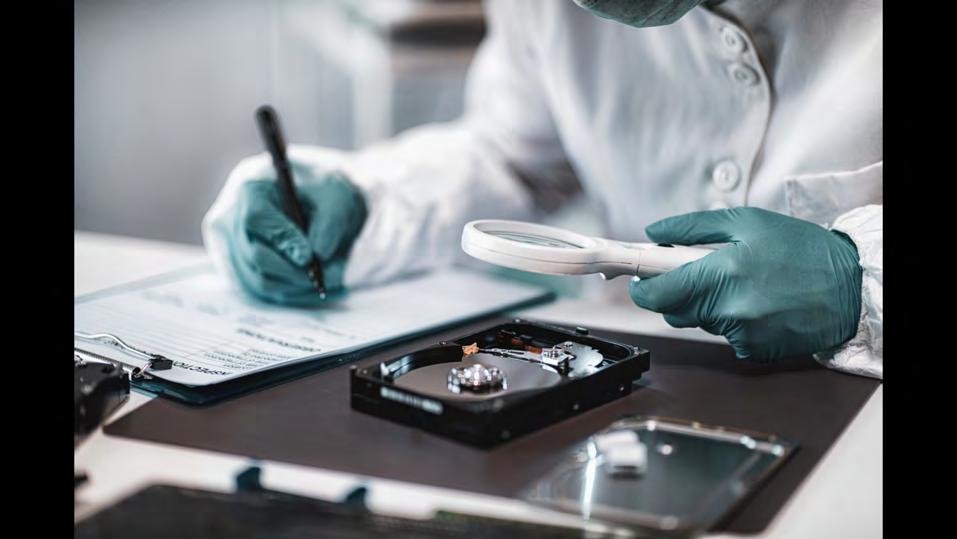
DFS consists of 14 scientific units, and each must complete and report proficiency test results to their accrediting board/compliance agency in a timely manner. The Quality Assurance Unit helped the agency meet its target percentage of scientists meeting technical competency requirements by monitoring competency and proficiency testing to ensure scientists are maintaining the necessary skills to perform analyses.
The Quality Assurance Unit performed robust internal audits of PHL and FSL. During the audits, several scientists were trained as auditors and assigned to perform in-depth reviews of various components of the laboratories. The internal audits concluded with an Annual Management Review during which all audit findings were addressed, and appropriate corrective and preventative actions were initiated. Successful audits were a key component of preparing for upcoming accreditation and compliance external assessments.
The following audits were successfully FY23:
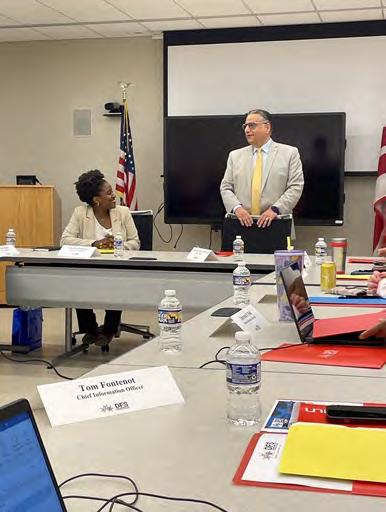
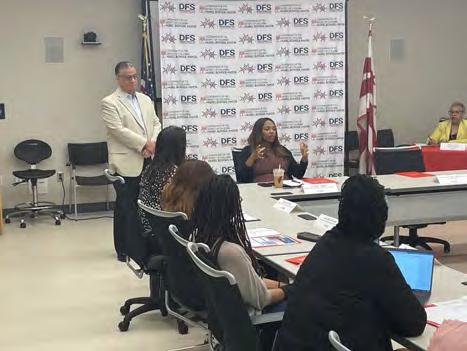
• CDC and Prevention - Division of Select Agents and Toxins
•Clinical Laboratory Improvement Amendments
• D.C. Health and Regulation and Licensing Administration
•FBU
•FCU
•LFU
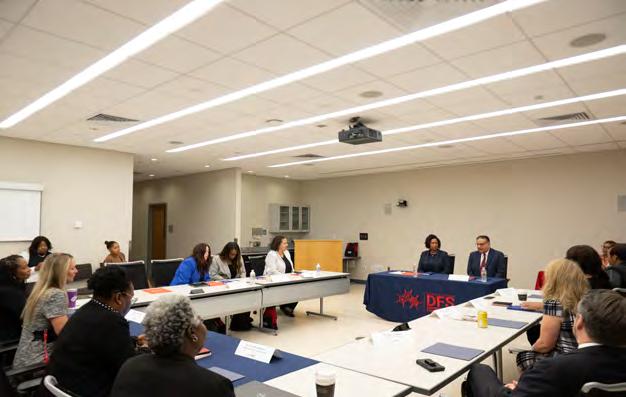
The Quality Assurance Unit submitted applications to the Association of Forensic Quality Assurance Managers (AFQAM) in FY23 and were all granted membership in early FY24.
In 2023, DFS Health and Safety Unit made significant strides in enhancing workplace safety and training. The team welcomed two new Safety Specialists, further strengthening our commitment to a safer work environment. Additionally, a Safety Training Specialist Position was created to show our dedication to improving safety education. The unit also made large overhauls to the safety training programs, ensuring they are more effective and relevant. The unit collaborated closely with the DC Homeland Security and Emergency Management Agency (HSEMA) to complete detailed service plans for all three units to ensure that during the time of an emergencies, DFS is there to provide critical services to the District and its residents. Furthermore, the revamping of our Continuity of Operations Plan (COOP) ensures that we are better prepared for any emergencies, reflecting our ongoing commitment to safety and preparedness.
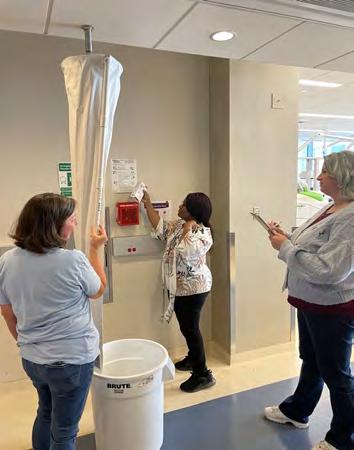
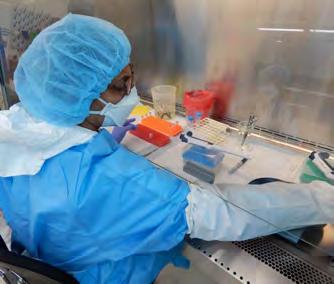



HE CSS is a 24/7 operation and was responsible for responding to thousands of crime scenes to collect and preserve more than 55,898 items of evidence in FY22 — at or as close as possible to the time of the original crime report. CSS is comprised of a diverse team that includes law enforcement professionals, forensic laboratory technicians, civilian crime scene technicians and property technicians. This diversity of backgrounds is the team’s strength.

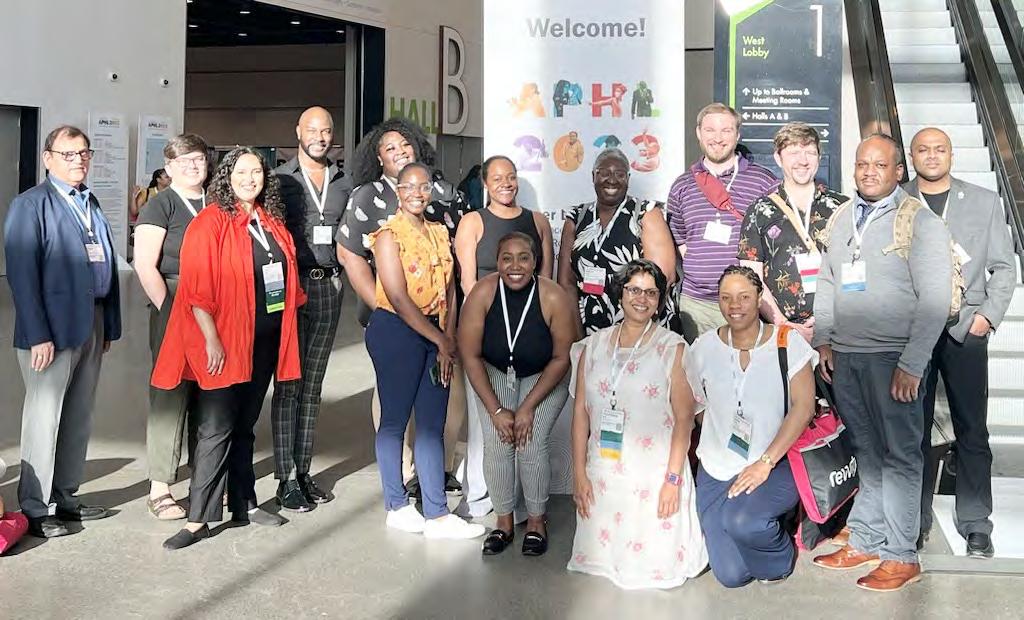

Throughout FY23, DFS team members attended and participated in several continuing education and professional development opportunities. Attendance at national conferences provides staff with networking and educational opportunities to learn about emerging technology and laboratory operational practices throughout the country. Staff attended several conferences:
• Society of Forensic Toxicology (SOFT) Conference
•American Academy of Forensic Sciences (AAFS) Conference
•OD2A Recipient Meeting
• Organization of Scientific Area Committees (OSAC) for Forensic Science Standards Meeting
• Mid-Atlantic Association of Forensic Sciences (MAAFS)
• 107th International Association for Identification (IAI) Educati
•American Society of Crime Laboratory Director (ASCLD) conference
•Association of Diagnostic Laboratory Medicine (ADLM)
•Association of Public Health Laboratory (APHL)
•American Society of Microbiology (ASM)
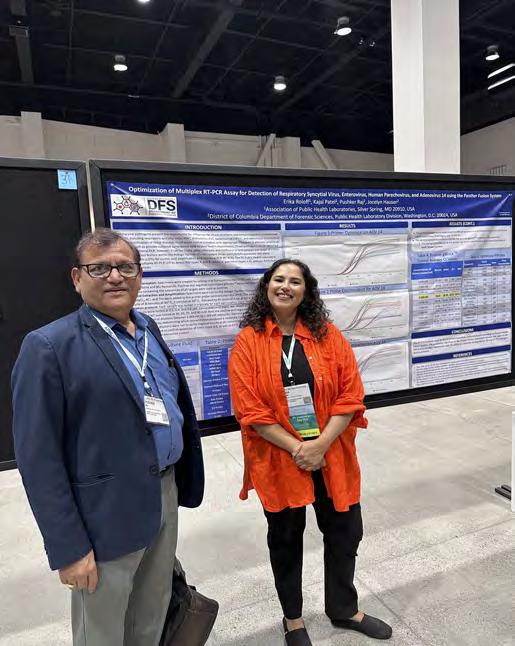
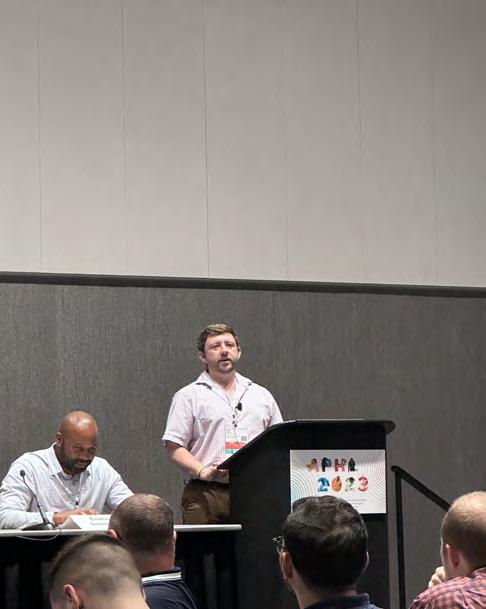
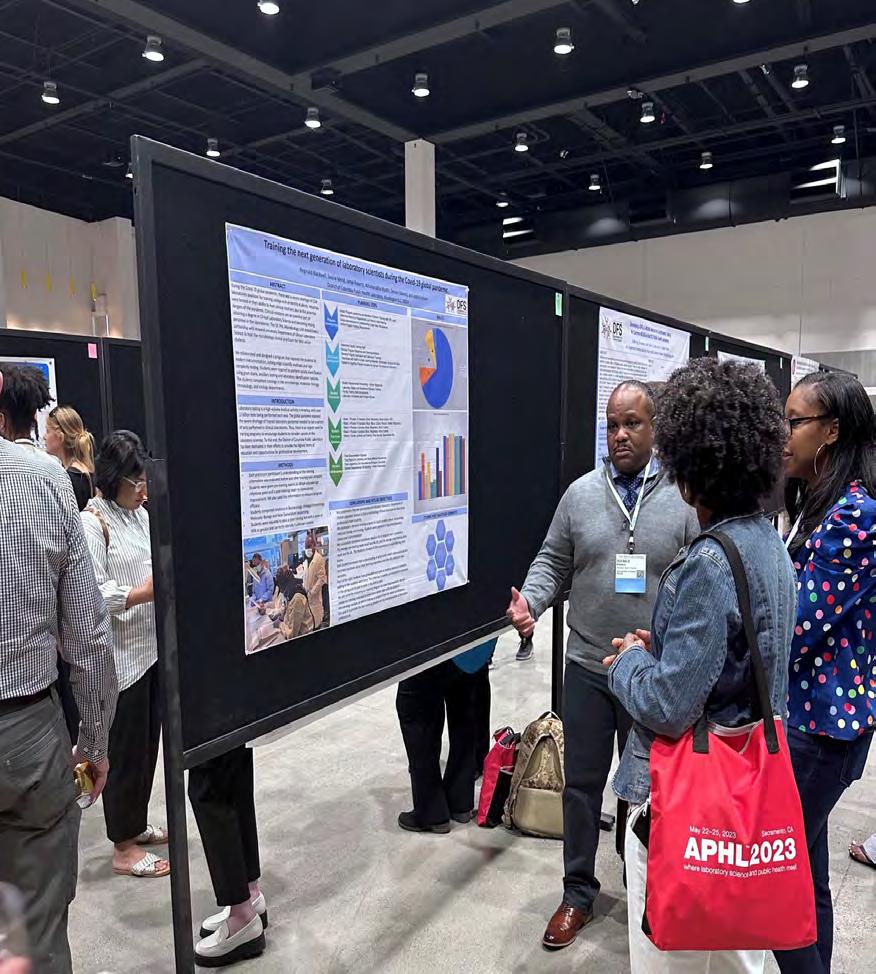

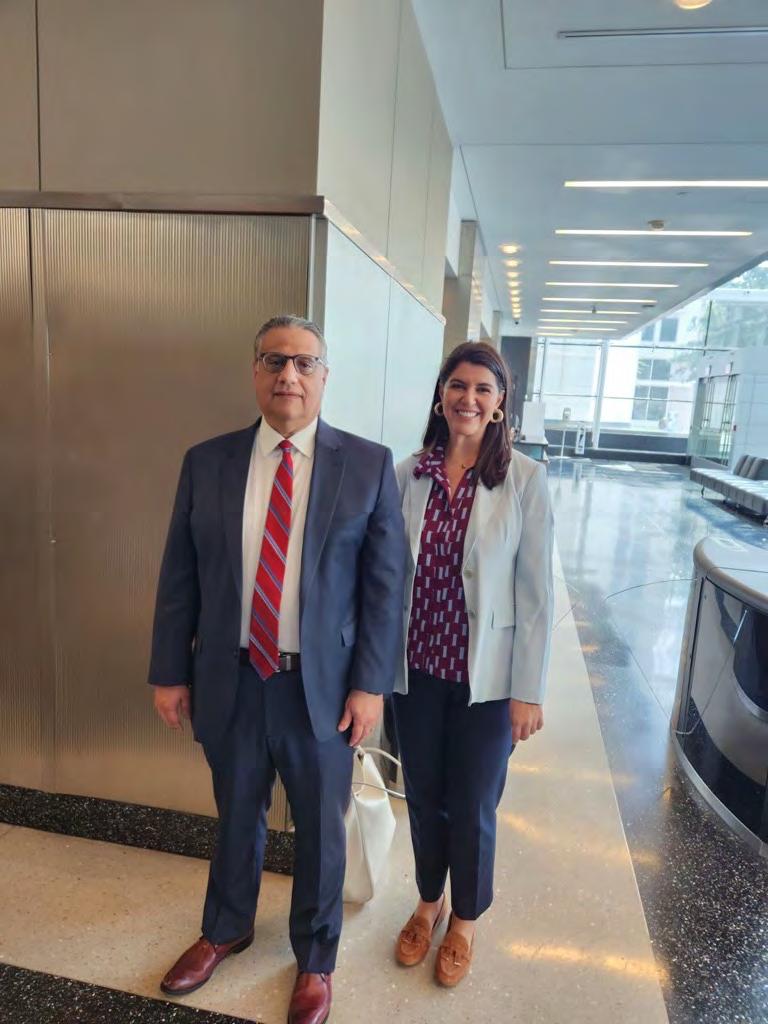
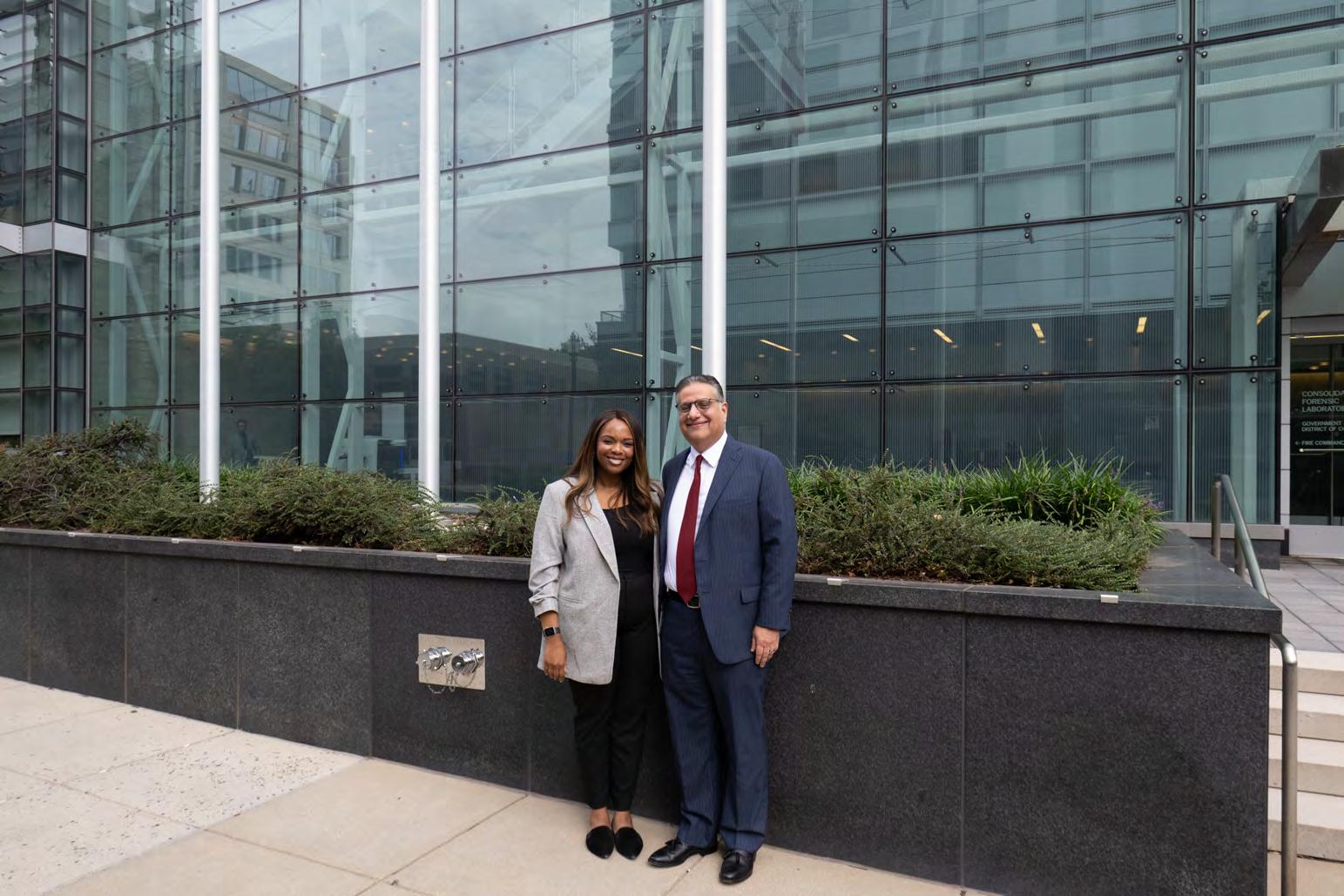
Our team has made significant strides in enhancing our testing capabilities and compliance standards. For FY24, we are focused on successfully onboarding urine toxicology testing for the DC DOC, ensuring rigorous screening processes that meet departmental needs. Additionally, we are at the forefront of public health innovation with the development of Clade I Mpox testing, a critical advancement in monitoring and controlling this emerging pathogen. Furthermore, we have integrated OD2A testing in our PHL, broadening our scope of diagnostic services to better serve our
CSS community. These achievements underscore our dedication to public health and our capability to deliver reliable and advanced diagnostic solutions.
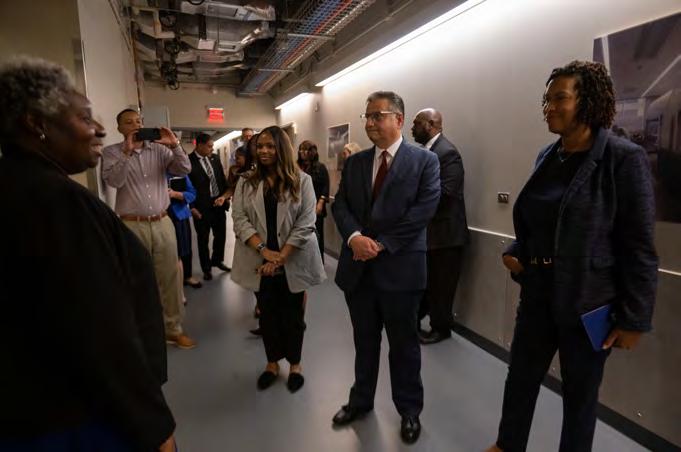
The CSS is pursuing ANAB accreditation, following the successful model used by FSL. To achieve this goal, the agency will:
Engage an external consultant to:
• Conduct a comprehensive assessment of CSSU operations
• Address any identified findings
Assist CSSU leadership in:
•Reviewing and revising all training manuals
• Updating Standard Operating Procedures (SOPs)
• Refining the Quality Assurance Manual
Prepare staff for the ANAB assessment, the contractor will:
•Conduct mock assessment interviews
The project's ultimate goal is to establish a CSSU operations and quality management system that fully complies with ISO/IEC 17020 standards.
In early FY24, FBU obtained ANSI National Accreditation Board (ANAB) accreditation. This achievement restored FBU's access to federal funding through the DNA Capacity Enhancement for Backlog Reduction program. With this funding, FBU is launching a Backlog Mitigation Project.
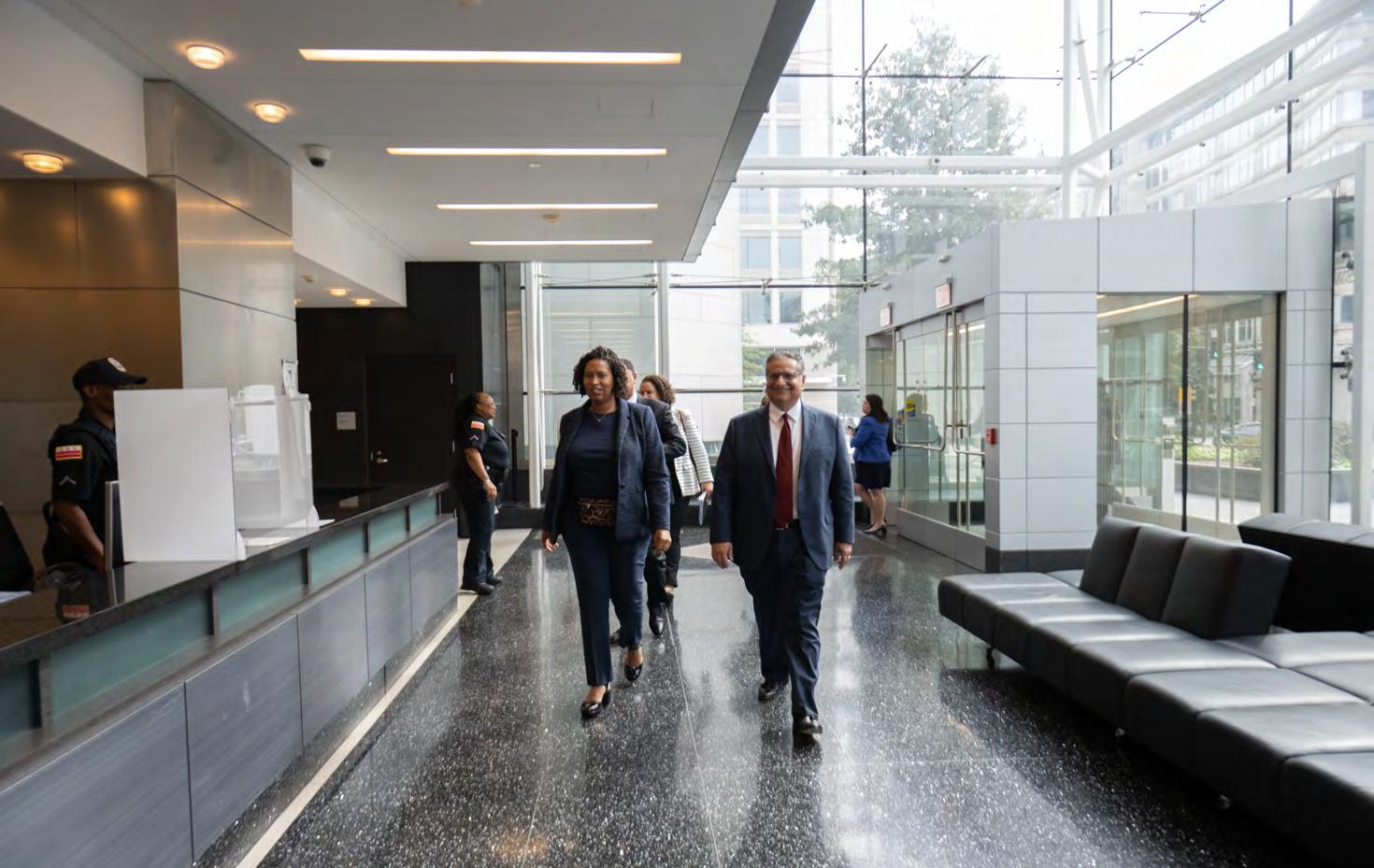
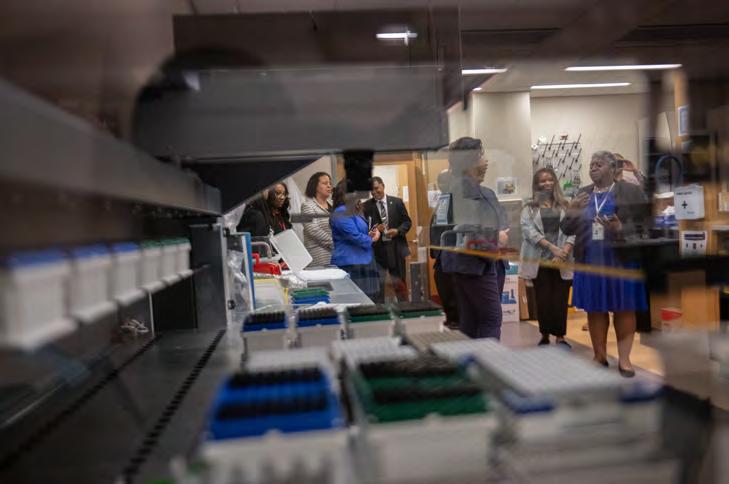

Collaborating with the DFS Central Evidence Unit, MPD Evidence Control Branch, and DC Office of Procurement and Contracts, FBU plans to outsource nearly all backlogged cases accumulated during the loss of accreditation. This strategy allows the FBU staff to focus on entering DNA profiles into CODIS.
The Backlog Mitigation Project aims to swiftly reduce the case backlog while transitioning back to in-house testing. This approach enables DFS to efficiently address accumulated cases and resume normal operations.
LFU will continue to prepare for and obtain ANAB accreditation. The unit will complete the development, approval, and dissemination of Standard Operating Procedures (SOPs) and the training manual. The unit will initiate mock casework and perform an external mock assessment. Finally, the unit will on-board a Unit Manager and Technical Leader, positioning it for a successful ANAB assessment.
FIU will work closely with DFS IT and external agencies to streamline evidence testing requests. Currently, external agencies submit requests for evidence testing through various mechanisms requiring data to be re-entered and increasing the risk of human error.

































